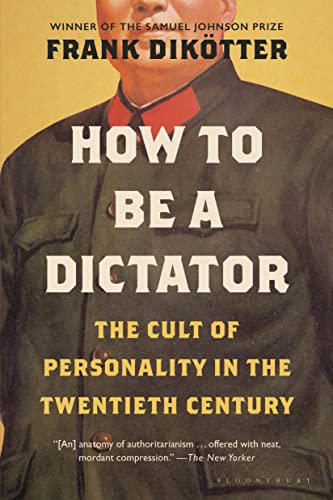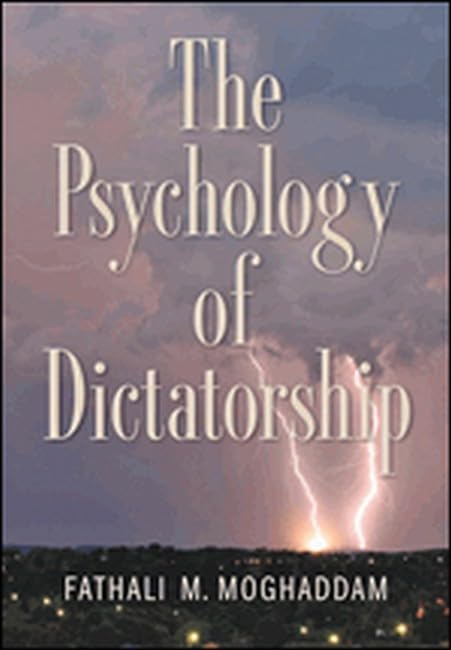Are you intrigued by the complex minds behind the power structures that shape our world? Understanding the psychology of dictatorship can offer profound insights into historical patterns, motivations, and the behaviors of influential leaders. In this article, we’ve compiled a list of the top 10 books that delve deep into the psyche of dictators and authoritarian regimes. Each selection is a brilliant exploration of themes like control, charisma, and ideological belief systems, providing readers with thought-provoking perspectives. Whether you’re a history buff, a psychology student, or just curious about political power dynamics, this curated list will guide you through essential reads that dissect the motives and machinations behind some of the most notorious figures in history.
As an Amazon Associate, I earn from qualifying purchases.
10. How to Be a Dictator: The Cult of Personality in the Twentieth Century
$10.39$0.00$9.87 • 4.4 Stars • 367 Reviews

‘How to Be a Dictator: The Cult of Personality in the Twentieth Century’ is a compelling exploration of the psychological underpinnings and societal impacts of authoritarian regimes. With a stellar rating of 4.4 from 367 reviews, this book offers readers a captivating account of how dictators build their identities and manage their public personas. Priced affordably at $10.39, it stands out not just for its insightful content, but also for its engaging narrative style. The text delves into the psychology behind the cult of personality, demonstrating how these leaders manipulate mass perceptions and leverage media to solidify their power. Ideal for students, historians, and anyone interested in political psychology, the book is meticulously researched and filled with case studies from the twentieth century that vividly illustrate the traits and tactics of various dictators. Pros include its thorough analysis and accessible prose, making complex psychological concepts understandable. However, some readers may find it lacks a broad global perspective, focusing primarily on well-known historical figures. Overall, this book is a must-read for those eager to comprehend the intricate dance between power, personality, and public perception.
Discover the Fascinating Insights of ‘How to Be a Dictator’ – Click Here!
9. The Crowd: A Study of the Popular Mind
$0.49$11.95$0.00 • 4.5 Stars • 1210 Reviews

Delve into the mind of society with ‘The Crowd: A Study of the Popular Mind’ by Gustave Le Bon, a seminal piece originally published in 1895 that continues to resonate with readers today. This compelling work provides a profound exploration of the psychology behind mass behavior, revealing how individuals often act differently when immersed in a crowd. Key features of the book include an examination of the emotional dynamics that prompt collective actions, from enthusiasm to fear, showcasing how these forces can manipulate and steer public sentiment. Le Bon also highlights the phenomenon of lost individual identity within crowds, shedding light on how leaders exploit this to wield influence over large groups. With a stellar 4.5-star rating from over 1210 reviews, this book is not only an essential read for students of sociology and psychology, but also for anyone intrigued by the dynamics of social movements and change. It’s an invaluable resource for those looking to understand the intersection of psychology and societal behavior, whether for academic, professional, or personal interest. A minor con might be its dated perspective, reflecting the era in which it was written, but the insights remain powerful and relevant today. Ideal for historians, political enthusiasts, or psychology students, ‘The Crowd’ offers timeless knowledge on the forces that shape our collective identities.
Explore ‘The Crowd: A Study of the Popular Mind’ Now!
8. How to Stand Up to a Dictator: The Fight for Our Future
$15.99$0.00$13.99 • 4.7 Stars • 838 Reviews

How to Stand Up to a Dictator: The Fight for Our Future by Maria Ressa is a gripping and essential memoir that combines personal narrative with urgent political insights, making it a vital read in the landscape of contemporary literature on authoritarianism. With an impressive 4.7-star rating and over 838 reviews, this book serves as a powerful call to action for anyone concerned about the fragility of democracy. Ressa, a Nobel Peace Prize recipient, chronicles her relentless battle against fascism in the Philippines, drawing on her rich experiences as an investigative journalist and founder of the groundbreaking online news platform, Rappler. The book emphasizes key themes of empathy, truth, and civic engagement while dissecting how social media has been manipulated to spread disinformation and fuel division. Readers will appreciate Ressa’s candid storytelling, bolstered by a foreword from human rights lawyer Amal Clooney, which enhances its credibility. While the book is profoundly inspirational, it might be challenging for those unfamiliar with the complexities of modern politics. Nonetheless, it is ideally suited for activists, students of political science, and anyone who values democratic freedoms. In an era where misinformation threatens societal cohesion, ‘How to Stand Up to a Dictator’ is not just a memoir – it’s a survival guide for civic responsibility.
Discover how to take a stand – Explore ‘How to Stand Up to a Dictator’ now!
7. The Psychology of Totalitarianism
$0.00$16.70$18.99 • 4.7 Stars • 1551 Reviews

The Psychology of Totalitarianism by Mattias Desmet is a groundbreaking examination of the psychological underpinnings of dictatorial regimes. With an impressive star rating of 4.7 from over 1,500 reviewers, this book dives deep into the phenomenon of ‘mass formation’—a type of collective hypnosis that occurs during crises, compelling groups to act against their own interests in favor of totalitarian ideologies. Desmet meticulously connects historical threads from the Jacobins to modern-day totalitarianism, revealing how governments and mass media exploit loneliness and fear to manipulate public sentiment and silence dissent. This book offers not only a sobering perspective on our current societal landscape but also provides an insightful analysis of how these psychological tactics play out through technology and communication.
Key Features:
– Comprehensive exploration of the psychological mechanisms behind totalitarianism.
– Historical context that connects past and present authoritarian movements.
– In-depth analysis of societal conditions conducive to mass formation.
Benefits:
Readers will gain a better understanding of how fear and isolation can lead societies to surrender their freedoms. The book is designed for those who are concerned about the trajectory of modern governance and the psychological tactics employed by leaders and media. It’s an essential read for activists, psychologists, and anyone interested in safeguarding democratic values in an increasingly polarized world.
Pros and Cons:
– Pros: In-depth analysis, relevant historical examples, strong academic credibility.
– Cons: Some readers may find the dense academic language a bit challenging, and certain concepts may require deeper reflection.
Best Suited For:
This book is ideal for scholars, students of psychology or political science, and activists who wish to understand the undercurrents of modern totalitarianism and its psychological implications. Whether you are an academic or simply a curious reader, Desmet’s insights are crucial for anyone looking to navigate today’s complex political landscape.
Discover the insights of ‘The Psychology of Totalitarianism’ – Click here for details!
6. The Psychology of Dictatorship
$111.75 • Stars • 4 Reviews

‘The Psychology of Dictatorship’ by Fathali M. Moghaddam is an insightful exploration into the psychological underpinnings that facilitate the rise and maintenance of dictatorship. This book introduces Moghaddam’s innovative ‘springboard model,’ which draws upon his extensive analysis of dictatorial structures and his own life experiences under a regime of repression. Key features of the book include an in-depth discussion of psychological processes like the displacement of aggression, conformity, obedience, fear, and cognitive dissonance—highlighting how these elements contribute to the formation of authoritarian governments. Additionally, the author emphasizes the significant role ideology plays in binding elites to the dictator’s rule. Readers will appreciate the pervasive relevance of this work, as it touches on the shifting relationship between democratic and dictatorial forces present even in modern democracies. At a price of $111.75, the book is designed for scholars, political scientists, and psychologically-inclined readers interested in understanding the psychological dynamics of power. With a respectable star rating of 4 and a total of 4 reviews, the book does have its pros and cons; while it provides profound theoretical insights, some readers might find its academic style dense at times. However, for anyone seeking to comprehend the mental mechanisms behind dictatorship and the fragility of democracy, this book remains a crucial read.
Discover the Mind Behind Power: Explore ‘The Psychology of Dictatorship’ Now!
5. Nuremberg Diary
$13.59 • 4.8 Stars • 268 Reviews

Nuremberg Diary is a profound exploration of the psychology behind one of history’s darkest chapters, crafted by G. M. Gilbert, who served as the prison psychologist for key Nazi war criminals during the Nuremberg Trials. This gripping narrative not only captures the chilling responses of notorious figures like Göering, Speer, and Hess to their impending fate, but it also dissects their motivations and justifications for the atrocities committed during the Nazi regime. Gilbert’s informal approach, combined with his unique access to these individuals, allows readers to gain eerie insights into their minds as they grapple with guilt, responsibility, and the collapse of the Third Reich. The book boasts a stellar 4.8-star rating from 268 reviews, signaling its impact and relevance. Priced at $13.59, it’s an accessible read for those interested in psychology, history, or the intricate dynamics of power. Pros of the book include its in-depth psychological analysis and intimate portrayal of historical figures, providing a unique perspective often absent from conventional history books. However, a con might be that readers seeking a broader overview of World War II may find the focus too narrow, as it centers exclusively on the trial and psychological evaluations. This book is best suited for psychology enthusiasts, students of history, or anyone seeking to understand the mental underpinnings of tyranny and compliance.
Discover the Nuremberg Diary: Click here for more details!
4. On the Dictatorship of the Proletariat
$23.79 • 5 Stars • 2 Reviews

On the Dictatorship of the Proletariat by Étienne Balibar is an essential read for anyone interested in the intricacies of political theory and the evolution of communist ideology. This book critically examines the necessity of the dictatorship of the proletariat, arguing against its recent dismissal by the French Communist Party during their pivotal 22nd Congress. Priced at $23.79, it is a valuable investment for students, political scholars, or activists seeking to understand the implications of shifting ideologies within Western European Communist Parties. Balibar’s detailed analysis draws from historical and contemporary examples, making compelling connections that resonate beyond France, highlighting the widespread ideological shifts occurring across Europe. Readers will appreciate the book’s rigorous exploration of its themes, coupled with its accessible language, which broadens its appeal. With an impressive 5-star rating from 2 reviews, this book stands out not only for its scholarly insight but also for its engaging writing style. However, it may not be suited for casual readers unfamiliar with political theory, as it dives deep into complex arguments that require a foundational understanding of the subject matter. Overall, ‘On the Dictatorship of the Proletariat’ is perfect for academics and dedicated political enthusiasts wanting to delve into significant historical debates surrounding socialism and governance.
Discover the Revolutionary Insights of ‘On the Dictatorship of the Proletariat’!
3. Daily Dose of Psychology: 365 Lessons on Cognitive Biases from Headlines to History
$0.00$19.69 • 5 Stars • 17 Reviews

### Daily Dose of Psychology: 365 Lessons on Cognitive Biases from Headlines to History
Unlock the fascinating world of human psychology with ‘Daily Dose of Psychology,’ a thought-provoking book designed to be explored one day at a time. This unique tome dives deep into 61 cognitive biases that affect our daily decisions and relationships, delivering 365 captivating narratives that blend psychology with real-world scenarios. Each entry is crafted to keep you engaged with intriguing questions, clear explanations, and relatable examples—from how an inventive advertising campaign boosted Denmark’s birth rate to the captivating infiltration of a doomsday cult by scientists. Interactive elements like QR codes provide access to videos and articles to expand your understanding, while the daily format ensures this enlightening journey fits seamlessly into your busy lifestyle.
Key Features:
– Daily engaging readings with diverse psychological concepts
– Interactive QR codes for supplementary resources
– Real-world applications to improve decision-making
Benefits:
Readers will find themselves gaining valuable insights into the psychology behind everyday decisions and behaviors, improving their self-awareness and connections with others. This book effectively demystifies complex topics, making them accessible for everyone.
Standout Qualities:
The integration of humor, real-life stories, and interactive learning sets this book apart from traditional psychology texts. Its structured format promotes a habit of daily learning, making it a perfect companion for anyone looking to better understand themselves and those around them.
Pros:
– Engaging and accessible writing style
– Covers a wide range of cognitive biases
– Daily format encourages consistent learning
Cons:
– Might not provide in-depth academic analysis for seasoned psychology enthusiasts
– The daily reading format may not appeal to those who prefer to binge-read
Best Suited For:
‘Daily Dose of Psychology’ is perfect for psychology enthusiasts, business professionals aiming to refine their decision-making skills, or anyone curious about the intricacies of human behavior. Whether you’re new to the field or a seasoned cognitive science aficionado, this book is sure to offer fresh and enlightening perspectives every day.
Discover the Power of Your Mind: Explore Now!
2. The Psychology of Democracy
$72.24 • 5 Stars • 6 Reviews

Dive into the intricate dynamics that shape governance with ‘The Psychology of Democracy’ by Fathali M. Moghaddam. This compelling read delves into how our psychological makeup influences democratic processes, addressing the critical question of why democracy flourishes in some societies while remaining elusive in others. The author skillfully weaves together research from psychology, political science, and historical examples to highlight the psychological conditions necessary for democracy, such as freedom of speech and minority rights, while advocating for the cultivation of these traits among citizens. At a price of $72.24, this book stands out due to its insightful integration of interdisciplinary knowledge and its accessible writing style, ideal for scholars, students, and anyone interested in political psychology. However, its higher price point may deter casual readers. With a solid 5-star rating from six reviews, ‘The Psychology of Democracy’ is perfect for academics, policymakers, or engaged citizens eager to understand and promote democratic ideals in their own communities.
Discover the Insights of Democracy – Learn More!
1. The psychology of dictatorship;: Based on an examination of the leaders of Nazi Germany
• 5 Stars • 2 Reviews

‘The Psychology of Dictatorship: Based on an Examination of the Leaders of Nazi Germany’ by G.M. Gilbert is a compelling exploration of the psychological mechanisms behind some of history’s most notorious dictators. With a star rating of 5 and a concise collection of reviews, this book draws readers in with its meticulous analysis based on Gilbert’s firsthand experiences as a prison psychologist during the Nuremberg Trials. By delving deep into the psychological profiles of figures such as Hermann Göring and Rudolf Hess, Gilbert cleverly unpacks the personal and systemic factors that fostered the rise of authoritarianism in Nazi Germany. Readers will benefit from Gilbert’s unique observations that dissect the interplay between individual psychopathology and overarching power dynamics, making this text essential for anyone interested in psychology, history, or political science. While some readers might find the historical context overwhelming, the insights provided offer immense value for academics, historians, and anyone keen on understanding the darker sides of human behavior and the mechanisms of power. Perfect for students, history enthusiasts, and those keen on cognitive psychology, this profound work challenges its audience to reflect on the nature of authority and the human psyche.
